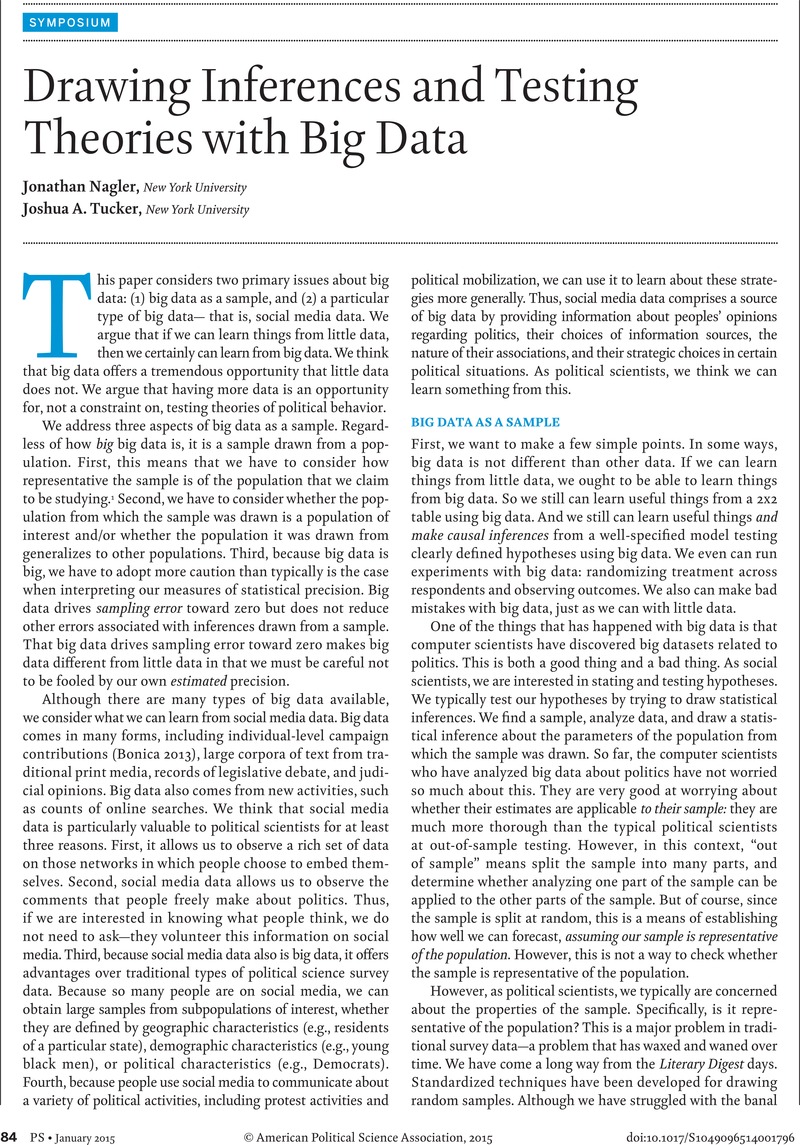Crossref Citations
This article has been cited by the following publications. This list is generated based on data provided by Crossref.
Bholat, David M.
Hansen, Stephen
Santos, Pedro M.
and
Schonhardt-Bailey, Cheryl
2015.
Text Mining for Central Banks.
SSRN Electronic Journal,
Reith, Nicholas E.
Paxton, Pamela
and
Hughes, Melanie M.
2016.
Building Cross-National, Longitudinal Data Sets: Issues and Strategies for Implementation.
International Journal of Sociology,
Vol. 46,
Issue. 1,
p.
21.
Dalton, Russell J.
2016.
The Potential of Big Data for the Cross-National Study of Political Behavior.
International Journal of Sociology,
Vol. 46,
Issue. 1,
p.
8.
Gehner, Monika
and
Oughton, Deborah
2016.
Ethical challenges in social media engagement and research: considerations for code of engagement practices.
Journal of Radiological Protection,
Vol. 36,
Issue. 2,
p.
S187.
Jenkins, J. Craig
Slomczynski, Kazimierz M.
and
Dubrow, Joshua Kjerulf
2016.
Political Behavior and Big Data.
International Journal of Sociology,
Vol. 46,
Issue. 1,
p.
1.
Umit, Resul
2017.
Strategic communication of EU affairs: an analysis of legislative behaviour on Twitter.
The Journal of Legislative Studies,
Vol. 23,
Issue. 1,
p.
93.
Vaccari, Cristian
and
Valeriani, Augusto
2018.
Digital Political Talk and Political Participation: Comparing Established and Third Wave Democracies.
Sage Open,
Vol. 8,
Issue. 2,
Ceron, Andrea
and
Curini, Luigi
2018.
e-Campaigning in the 2014 European elections.
Party Politics,
Vol. 24,
Issue. 2,
p.
105.
Möller, Per
and
Dowling, Thomas P. F.
2018.
Equifinality in glacial geomorphology: instability theory examinedviaribbed moraine and drumlins in Sweden.
GFF,
Vol. 140,
Issue. 2,
p.
106.
Stockmann, Daniela
2018.
Toward Area‐Smart Data Science: Critical Questions for Working With Big Data From China.
Policy & Internet,
Vol. 10,
Issue. 4,
p.
393.
Kirkwood, Steve
Cree, Viviene
Winterstein, Daniel
Nuttgens, Alex
and
Sneddon, Jenni
2018.
Encountering #Feminism on Twitter: Reflections on a Research Collaboration between Social Scientists and Computer Scientists.
Sociological Research Online,
Vol. 23,
Issue. 4,
p.
763.
Ceron, Andrea
Curini, Luigi
and
Iacus, Stefano M.
2019.
ISIS at Its Apogee: The Arabic Discourse on Twitter and What We Can Learn From That About ISIS Support and Foreign Fighters.
Sage Open,
Vol. 9,
Issue. 1,
Wilkins, Denise J.
Livingstone, Andrew G.
and
Levine, Mark
2019.
Whose tweets? The rhetorical functions of social media use in developing the Black Lives Matter movement.
British Journal of Social Psychology,
Vol. 58,
Issue. 4,
p.
786.
Brady, Henry E.
2019.
The Challenge of Big Data and Data Science.
Annual Review of Political Science,
Vol. 22,
Issue. 1,
p.
297.
Liu, Zhicheng
and
Zhang, Aoqian
2020.
Sampling for Big Data Profiling: A Survey.
IEEE Access,
Vol. 8,
Issue. ,
p.
72713.
Mavriki, Paola
and
Karyda, Maria
2020.
E-Democracy – Safeguarding Democracy and Human Rights in the Digital Age.
Vol. 1111,
Issue. ,
p.
3.
Findley, Michael G.
Kikuta, Kyosuke
and
Denly, Michael
2021.
External Validity.
Annual Review of Political Science,
Vol. 24,
Issue. 1,
p.
365.
Praet, Stiene
Van Aelst, Peter
van Erkel, Patrick
Van der Veeken, Stephan
and
Martens, David
2021.
Predictive modeling to study lifestyle politics with Facebook likes.
EPJ Data Science,
Vol. 10,
Issue. 1,
Colombo, Matteo
and
Curini, Luigi
2022.
Discussing the Islamic State on Twitter.
p.
23.
Xia, Shouzhi
2024.
Demystifying the dynamics of China’s overseas image with a large-scale social media dataset.
Journal of Elections, Public Opinion and Parties,
p.
1.


